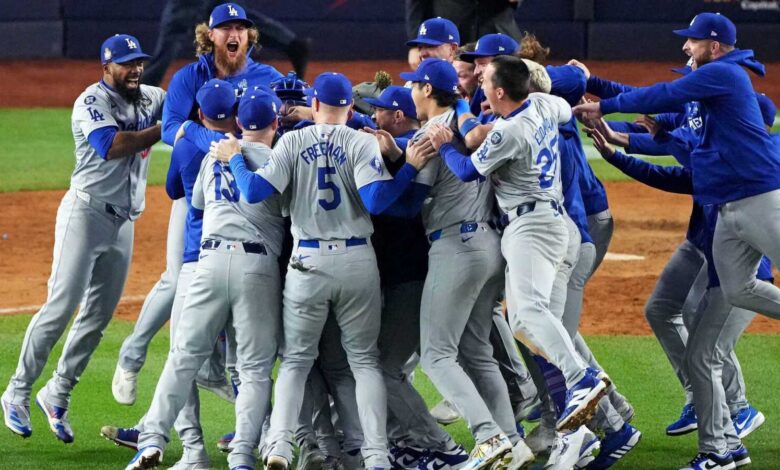MLB’s big spenders keep winning while small markets hide behind excuses

Want to know who’ll win the World Series? Follow the money.
Since the beginning of the wild-card era in 1995, a staggering 27 of 30 World Series champions ranked in the top half of MLB payrolls, with 21 sitting in the top 10. That proves that cash has never bought wins more effectively than today.
The Los Angeles Dodgers’ World Series title, powered by historic investments in superstar Shohei Ohtani (10 years, $700M) and right-hander Yoshinobu Yamamoto (12 years, $325M) reinforces baseball’s stark reality.
Since free agency began in 1975, the system has increasingly favored big spenders, with the MLB Players Association arguing the luxury tax functions as a salary cap designed to limit player earnings.
The small-market illusion
Small-market teams continue to cry poverty while pocketing revenue-sharing checks, broadcasting rights fees and sponsorship dollars.
Take the Oakland Athletics: Despite reaching the playoffs 11 times since 1995, they advanced past the division series just once. The Tampa Bay Rays tell a similar story — since 2008, they’ve engineered eight playoff appearances, with the only meaningful postseason run coming during the Covid-altered 2020 format.
Look at the raw numbers. The Athletics’ $63.4M payroll in 2024 wouldn’t even reach 30% of MLB’s luxury tax threshold ($237M for player salaries and benefits). The Tampa Bay Rays ($88.8M) and Cleveland Guardians ($106.8M) aren’t much better.
These teams operate within a broken system that allows them to profit while fielding rosters lacking top-end talent and essential depth.
The salary disparities expose the fundamental problem. Dodgers pitcher Tyler Glasnow will earn $32.5M in 2025. Meanwhile, Cleveland’s best player, third baseman Jose Ramirez, will make $19M. That’s less than even mid-market St. Louis Cardinals right-hander Sonny Gray’s $25M salary.
A system that rewards mediocrity
Ironically, when small-market teams spend, they can succeed. The 1997 Florida Marlins proved this by launching an $89M free-agent spending spree that transformed their payroll from $25.3M to $52.5M. They won their first championship as a result.
MLB’s Competitive Balance Tax was designed to punish big spenders such as the Dodgers and New York Yankees, with that money flowing to smaller markets. But instead of reinvesting in talent, teams such as Cleveland pocket the cash and let others pay for their lack of ambition.
The solution: A mandatory floor
The answer is clear: MLB needs a salary floor requiring teams to spend within 10% of the luxury-tax threshold. This would force ownership to invest in talent rather than hide behind market-size excuses that haven’t made sense since the 1970s.
The NBA already uses this model successfully. Its teams must spend 90% of the salary cap, creating legitimate competition between small and large markets.
Baseball could achieve the same balance by implementing a floor rather than simply taxing the top.
Building a sustainable future
A salary floor would revolutionize how small-market teams operate.
Instead of hoarding revenue-sharing money, they’d invest in scouting, player development and major-league talent. This would lead to more aggressive moves at trade deadlines, better free-agent pursuits and unexpected playoff contenders emerging from traditionally passive markets.
The ripple effects would transform baseball. Teams would build stronger farm systems to maximize their required investments. More competitive September baseball would drive fan engagement. Dynamic trade deadlines would create compelling narratives throughout the season.
Here’s the irony: This forced spending would actually make teams more money. Better rosters mean more fans in seats, increased merchandise sales and higher broadcast ratings.
When fans believe their team is genuinely trying to win, they invest emotionally and financially.
True parity isn’t just about preventing repeat champions — MLB hasn’t had one since the Yankees’ 1998-2000 run. It’s about giving every fan base legitimate hope.
Having different teams reach October means nothing if they’re not equipped with the talent and depth to actually win there.
The current system isn’t working. Until MLB mandates minimum spending, October baseball will remain a big-market game, leaving fans in Cleveland, Pittsburgh, Tampa Bay and other small markets wondering why their teams refuse to invest in winning.
The solution is simple. Baseball doesn’t need more complex luxury tax penalties or revenue-sharing schemes. It needs a salary floor that forces every team actually to compete.
After nearly 50 years of free agency, fans deserve more than hope — they deserve teams that honestly try to win.



